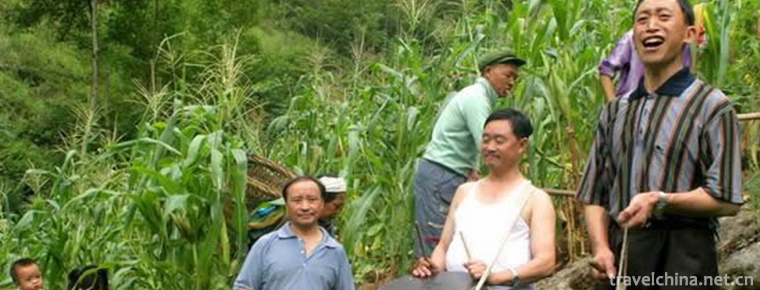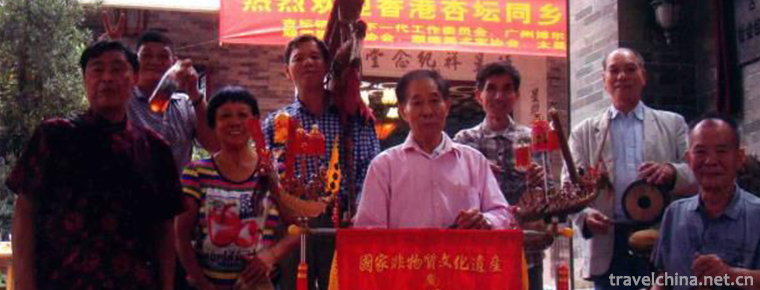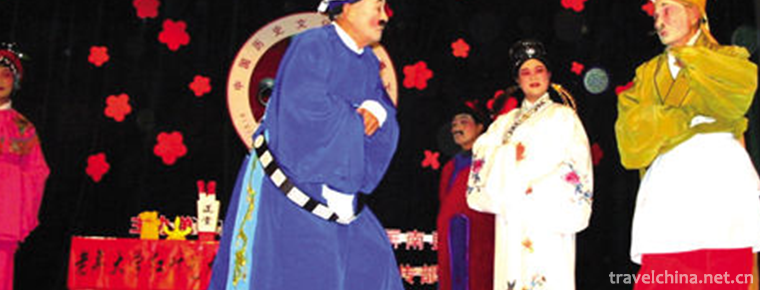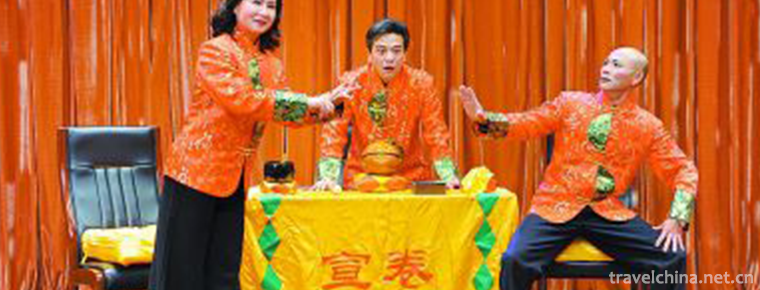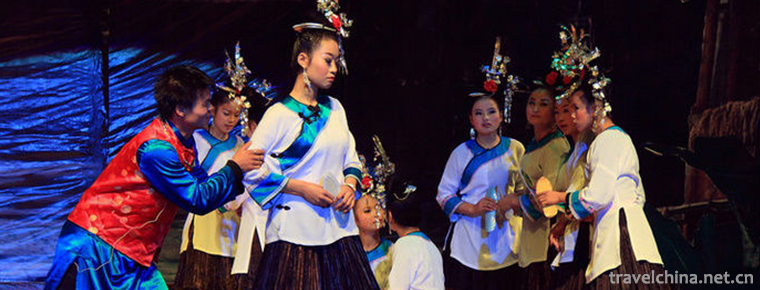Suqiao Flying Fork Club
Suqiao Flying Fork Club
Suqiao Flying Fork Club, also known as Yun Fork Club, is a local traditional acrobatics performance popular in Wen'an County, Hebei Province. The performances mainly consist of ancient forks, drums, cymbals and percussion music. The earliest content of the performances is "Five Ghosts Na Liu Shi". A total of 136 movements, the basic skills are: face-to-face flower, hand string, carp stand up, backwater and so on. Suqiao Flying Fork Club is different from other areas. The performances are divided into single and double forks. The forks are divided into single and double forks. They can be played by one person, by two people, by one person, by two people, and by three forks. List the second batch of national intangible cultural heritage.
historical origin
Suqiao Town, located 20 kilometers north of Wen'an County, is one of the most important towns along the Daqing River in Hebei Province. The original name of Jianzhen in Han Dynasty was eight surnames Zhuangzhuang, which was renamed Suqiao because Suyi, a writer in Song Dynasty, had once been in charge of Wen'an. At the end of Qing Dynasty and the beginning of Ming Dynasty, Feijiao Association in Suqiao Town was one of the most famous local cultural and recreational organizations. Suqiao Town is located in the triangle of Tianjin, Beijing and Baojiao. It is situated on the dike beside the Daqing River. It is a famous "drought and flood wharf". Opening on the fifth day - the fifth, fifteenth and twenty-fifth day of every month, and the first day is three days. At that time, people from around Yangliuqing, Shengfang and other places, far away Tianjin and Baiyangdian will come to the fair. The lively and prosperous life breeds all kinds of recreational activities, which has become one of the reasons for the prosperity of Flying Fork Club.
The fork is one of the ancient weapons. It is also used as a tool of entertainment and honor in ancient palaces. During the Three Kingdoms of the late Han Dynasty in the 1st and 3rd centuries, some warriors practiced crossing and lined up to perform crossing skills. Later, it gradually spread to the people and became one of the acrobatic forms popular with the working people. Suqiao flower fork association was founded between 1861 and 1875 A.D. (Tongzhi period of Qing Dynasty). It was handed down by Zhang Yuchun, a Shanxi native (famous master of Tongbei Quan). Zhang Yuchun studied art under the door of Han Pingshan, a Taoist priest of Baiyun Guan in Beijing. He passed flower fork on to Jin Xiaoxuan, Suqiao Town, Wen'an County, Hebei Province, and Jin Xiaoxuan to Jin Wenbin. In the late Qing Dynasty and early Republic of China in the early 20th century, Jin Wenbin built the Suqiao Flying Fork Club by combining the three skills of Tongbei, Taiji and flower fork. So Jin Wenbin is the founder of Suqiao Flying Fork Club.
Folklore Contents
The Flying Fork Club, also known as the Cloud Fork Club, is mainly composed of drums, cymbals and percussion instruments. The earliest performance content is "Five Ghosts Na Liu's". Suqiao Town performed "Five Ghosts Take Liu's" for seven days, two hours a day. Five Ghosts changed one face mask every day, altogether 35 faces in seven days. The fork has 136 movements. In addition to performing on the ground, it can also perform on the square bench with both legs. It can not only perform single fork, but also double fork, so as to achieve a pure fire.
Its basic skills include: facing flower, hand string, carp upright, backward water, four kicks (around), soft and hard high and short four kicks, anyway fork, left and right fork, one hand fork, two hands fork, water mill, golden thread wrapping, single finger spinning, ghost push mill, pull down pumpkin seedling, etc. "Eighteen Rolls in Situ" and "Back Sword in Su and Qin Dynasties". The four stunts are "dry grinding", "weighing money", "big back sword", "hard fish standing up" and so on.
Suqiao Flying Fork Club is different from other areas. The performances are divided into single and double forks. The forks are divided into single and double forks. They can be played by one person, by two people, by one person, by two people, and by three forks.
A Brief Introduction to the Play
The most common performance of "Flying Fork Club" is "Five Ghosts Take Liu's Family". Liu Shi was a woman in Tang Dynasty. She lost her husband in her early years and had four sons. Liu believed in God and Buddha and worshipped the throne at home all the year round, but because of his son's successive illness, he was angry and smashed the throne. So he infuriated the King of Yan and ordered five ghosts to capture Liu. After the Five ghosts took command, Liu was captured with a steel fork in hand. However, Liu's practice for many years has become a half-immortal body. After many pains, Liu was finally captured.
Inheritance and Protection
Jin Yueting, a disciple of Jin Wenbin, the founder of Suqiao Flying Fork Association, is also known as Jin Xiaoquan. In 1951, the Chinese folk opera consolation Troupe will go to the DPRK to console the volunteers. The head of the troupe, Chang Baoku (mushroom mushroom), personally went to Suqiao to find Jin Yuetang and invited him to perform in the DPRK. After arriving in Dandong, it was impossible to stay in Dandong because of severe dysentery. After returning, 14 disciples of Suqiao, such as Dixipeng, Zhao Jingtian, and Wang Shufang, Wang Keyi, Fan Jingquan and Gao Yin of Baxian County were handed down. The most famous of them are Dixipeng and Zhao Jingtian, who are still carrying on their art in the early 21st century.
All the members of Suqiao Flying Fork Club are farmers. With the development and change of rural economy, it has become a common phenomenon for farmers to engage in commercial trade and labor export in the leisure season, and economic problems have become the top priority that plagues the Suqiao Flying Fork Conference. Without economic income, no one is willing to learn, and all of them are only children. There is a certain danger in performance. Parents are unwilling to let their children learn, which seriously hinders the inheritance. As a result, Suqiao flying fork will lose its market, especially by the cold shoulder of young people.
In June 2008, Suqiao Feijiao will be selected as the second batch of national intangible cultural heritage list. During the Spring Festival every year, the Feijiao Festival performs in the performances of the mass Flower Fairs in Suqiao Town, and has participated in the performances of the intangible cultural heritage in Wen'an County, the performances of "going to the countryside three times", the performances of "Hebei Rural Cultural Work Conference" and the performances of leaders at all levels who come to Suqiao.
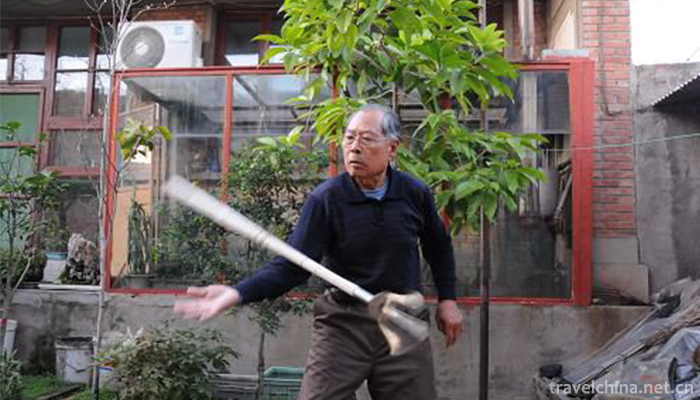
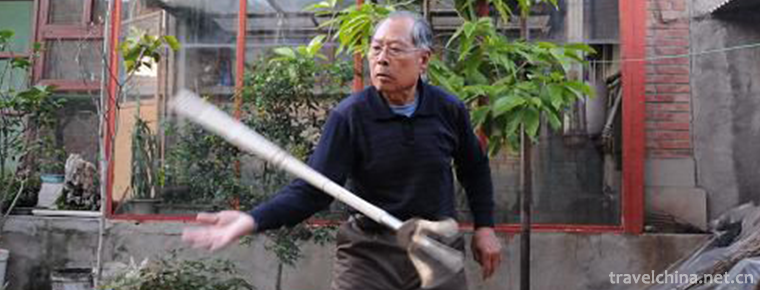
Suqiao Flying Fork Club
-
Mount Danxia Scenic Area
Danxia Mountain Scenic Area is located in Renhua County, northeast of Shaoguan, Guangdong Province. Danxia Mountain is composed of red sandy scintillate rocks and characterized by red cliffs. Geologis
Views: 174 Time 2018-12-12 -
Guan Tang hot spring
Guantang Hot Spring is located in Tangtou Town, Linyi City, Shandong Province, on the East Bank of Yihe River. The hot spring covers an area of nearly 260 Mu and has a construction area of 100,000 squ
Views: 210 Time 2019-01-13 -
Xingtai Grand Canyon Tourist Area
Xingtai Grand Canyon is a national AAAA scenic spot, a national key scenic spot and a national geological park of China. It is located in Hejiaping Village, Luozhen, Southwest Road
Views: 278 Time 2019-02-26 -
Zhangye National Wetland Park
Zhangye National Wetland Park is located in the northern suburbs of Ganzhou District, Zhangye City, which is closely linked with the urban area. Wetland area of 62,000 mu, the main body is located in
Views: 186 Time 2019-03-16 -
Grass grass drums and drums
Grass gongs and drums, also known as grass chants, are commonly known as "hilarious songs". It is a unique form of folk song art. It is a kind of Tujia folk song that the
Views: 146 Time 2019-05-02 -
Dragon Boat rap
Dragon boat rap, also known as "Dragon Boat", "Dragon Boat Song", "Dragon Island Song" or "Shunde Dragon Boat", is a popular form of folk art in the Pearl River
Views: 153 Time 2019-05-14 -
Ping Tan drama
Pingjiao Opera is a kind of high-pitched opera that sings opera and prose in local dialect. It is a unique local opera in Fujian Province. It was formed in the early Qing Dynasty, originated in Pingna
Views: 135 Time 2019-06-09 -
Pudong Publicity Book
Nanhui Xuanjuan is an ancient traditional art of rap and singing. Xuanjuan originated from "vulgar speaking" in Tang Dynasty and "Tanjing" in Song Dynasty. It is a term used by Bud
Views: 123 Time 2019-06-09 -
Zhulang Niangmei
Zhulang Niangmei is a work of Dong Opera in Guizhou Province. At the end of the Qing Dynasty, Liang Yaoting and Liang Shaohua, Dong opera masters in Congjiang County, Guizhou Province, adapted Dong dr
Views: 152 Time 2019-08-10 -
Anhui University Of Science & Technology(aust)
Anhui University Of Science And Technology is located in Anhui province. Huainan City Yes. Anhui higher education revitalization program Local characteristics High level University Construction, proje
Views: 564 Time 2019-10-10 -
Neijiangs first industry
In 2019, the sown area of grain crops in Neijiang is 309600 ha, an increase of 0.3% over the previous year; the sown area of oil crops is 79900 ha, an increase of 0.4%; and the sown area of vegetables is 78100 ha, an increase of 2.3%. The total grain output
Views: 316 Time 2020-12-16





